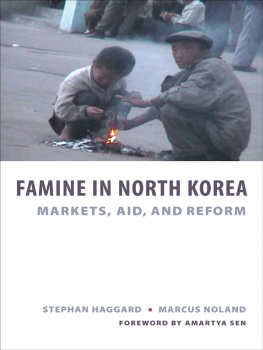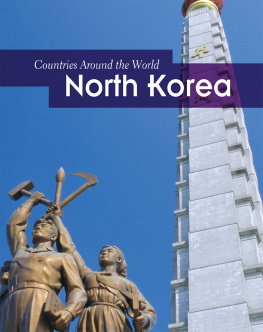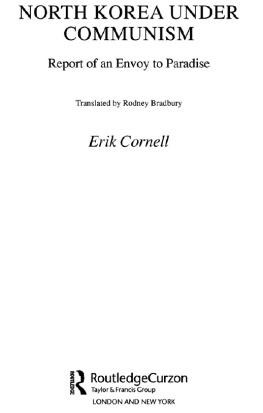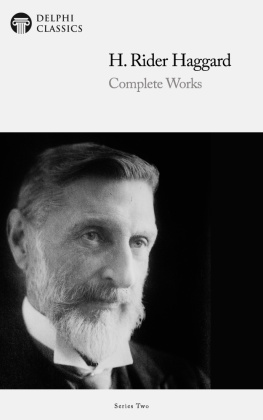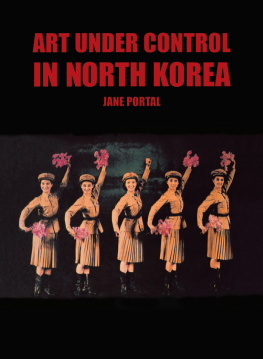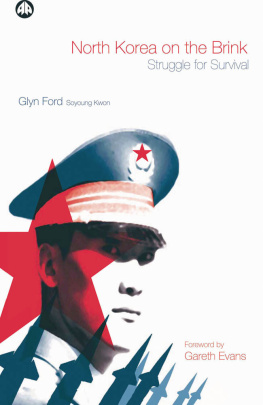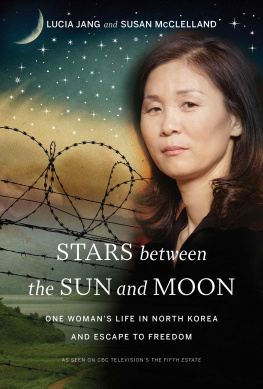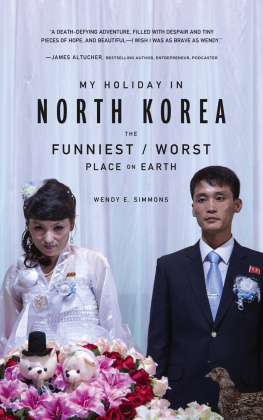Haggard Stephan - Famine in North Korea
Here you can read online Haggard Stephan - Famine in North Korea full text of the book (entire story) in english for free. Download pdf and epub, get meaning, cover and reviews about this ebook. year: 2012, publisher: Columbia University Press, genre: Politics. Description of the work, (preface) as well as reviews are available. Best literature library LitArk.com created for fans of good reading and offers a wide selection of genres:
Romance novel
Science fiction
Adventure
Detective
Science
History
Home and family
Prose
Art
Politics
Computer
Non-fiction
Religion
Business
Children
Humor
Choose a favorite category and find really read worthwhile books. Enjoy immersion in the world of imagination, feel the emotions of the characters or learn something new for yourself, make an fascinating discovery.
- Book:Famine in North Korea
- Author:
- Publisher:Columbia University Press
- Genre:
- Year:2012
- Rating:5 / 5
- Favourites:Add to favourites
- Your mark:
- 100
- 1
- 2
- 3
- 4
- 5
Famine in North Korea: summary, description and annotation
We offer to read an annotation, description, summary or preface (depends on what the author of the book "Famine in North Korea" wrote himself). If you haven't found the necessary information about the book — write in the comments, we will try to find it.
Famine in North Korea — read online for free the complete book (whole text) full work
Below is the text of the book, divided by pages. System saving the place of the last page read, allows you to conveniently read the book "Famine in North Korea" online for free, without having to search again every time where you left off. Put a bookmark, and you can go to the page where you finished reading at any time.
Font size:
Interval:
Bookmark:
STEPHAN HAGGARD AND
MARCUS NOLAND
FOREWORD BY AMARTYA SEN

Columbia University Press New York
Columbia University Press
Publishers Since 1893
New York, Chichester, West Sussex
cup.columbia.edu
Copyright 2007 by Stephan Haggard and Marcus Noland
All rights Reserved
E-ISBN 978-0-231-51152-0
Library of Congress Cataloging-in-Publication Data
Haggard, Stephan.
Famine in North Korea : markets, aid, and reform /
Stephan Haggard and Marcus Noland.
p. cm.
Includes bibliographical references and index.
ISBN 10: 0-231-14000-2 (clothbound : alk. paper)
ISBN 13: 9780-231-14000-3 (clothbound : alk. paper)
ISBN 10: 0-231-51152-3 (e-book)
ISBN 13: 9780-231-51152-0 (e-book)
1. FaminesKorea (North) 2. Food supplyKorea (North)
3. Food reliefKorea (North) 4. Korea (North)Economic conditions.
5. Korea (North)Economic policy.
6. Korea (North)Social conditions.
I. Noland, Marcus, 1959 II. Title.
A Columbia University Press E-book.
CUP would be pleased to hear about your reading experience with this e-book at .
References to Internet Web Sites (URLs) were accurate
at the time of writing. Neither the author nor
Columbia University Press is responsible for Web sites
that may have expired or changed since the book was prepared
To Sharon Crasnow and Christina Wood
Agricultural Recovery and Environmental Protection Plan | AREP |
Consolidated Appeals Process | CAP |
Democratic Peoples Republic of Korea | DPRK |
European Commision Humanitarian Aid Office | ECHO |
Flood Damage Rehabilitation Committee | FDRC |
Food and Agricultural Organization | FAO |
Food and Agricultural Organization and World Food Programme | FAO/WFP |
Food and Agricultural Organization Statistical Databases | FAOSTAT |
General Accounting Office | GAO |
General Affairs and External Relations Council | GAERC |
International Federation of Red Cross and Red Crescent Societies | IFRC |
Korea Development Institute | KDI |
Korea Institute for International Economic Policy | KIEP |
Korea Institute for National Unification | KINU |
Korean Buddhist Sharing Movement | KBSM |
Korean Peninsula Energy Development Organization | KEDO |
Mdecins sans Frontires | MSF |
metric ton | MT |
normal trade relations | NTR |
Office for the Coordination of Humanitarian Affairs | OCHA |
Proliferation Security Initiative | PSI |
public distribution center | PDC |
Public Distribution System | PDS |
state-owned enterprise | SOE |
Supreme Peoples Assembly | SPA |
United Nations Commodity Trade Statistics Database | UN-COMTRADE |
United Nations Office for the Coordination of Humanitarian Affairs | UN-OCHA |
United States Agency for International Development | USAID |
United States Department of Agriculture Foreign Agricultural Service | USDAFAS |
United Nations Development Program | UNDP |
weapons of mass destruction | WMD |
World Food Programme | WFP |
World Food Programme International Food Aid Information System | WFPINTERFAIS |
In 1844 a young but fast advancing British politician, Benjamin Disraeli, described the unusual features of a famine-ridden Ireland: you have a starving population, an absent aristocracy, and an alien Church, and in addition the weakest executive in the world. That, Disraeli went to say, is the Irish question. This remarkable book is a treatise on what can be called the North Korean question.
Stephan Haggard and Marcus Noland have presented here a penetrating investigation of the North Korean famine that started almost exactly 150 years after the Irish famine. The famine in North Korea has already killed a great many people, possibly as many as a million (about the same as the Irish famine of the 1840s), and it may kill many more unless the underlying causes are addressed and overcome. The Irish famine also led to a massive emigration from Ireland, particularly to North America. Many North Koreans too have tried to move out of their stricken country, especially to China, but the political barriers to such movement make the process hazardous and often unsuccessful.
Like its notorious Irish predecessor, the North Korean question too cannot but lead to a many-layered answer. It involves economics (especially the proximate as well as long-run causes of the failure of a huge section of the population to command enough food for survival), politics (in particular the nature and operation of the government that influenceoften adverselythe deprived peoples ability to have enough food), practical ethics (including the dilemmas faced by the international community in providing humanitarian aid that would actually help), and social organization (varying from the old socialist entitlements to the newly emerging marketized allocation). Stephan Haggard and Marcus Noland have greatly advanced the understanding of these difficult issues in the specific context of North Korea, but their study is likely to be of wider interest as well, since starvation and famines associated with economic malfunctions, organizational quandary, and political authoritarianism have had other victims across the world and may continue to flourish in the future, unless the causal processes are arrested and reversed.
Despite many similarities in outcome, the societal process that led to the North Korean famine is, in many ways, very dissimilar (as one would expect) to what happened in British Ireland in the 1840s. And yet there are also some odd resemblances between the two famines, respectively in the most thriving empire in recent history and the most problematic communist state in the contemporary world, separated by a century and a half. Even though Haggard and Noland do not get into this comparison (they have othermore immediate as well as more basicissues of the nature, causation, and consequences of the North Korean famine to address), it is instructive to see the similarities between two very different famines, drawing on the rich investigation of the North Korean famine presented in this book, in addition to other studies on the North Korean famine, and of course the comparatively voluminous literature on the Irish famine. (An illuminating and impressive study can be found in The Great North Korean Famines by Andrew S. Natsios, published in 2002.)
The dictatorial North Korean regime cannot certainly be described as the weakest executive in the world, in the way that Disraeli described Londons rule of Ireland. In fact, the North Korean administration is one of the most forceful and intrusive; it is also, as dissidents know chillingly well, extraordinarily fierce. And yet that ruthless state, with its well-oiled machinery of authoritarian repression, was also remarkably feeble in executing even the most elementary policies that could help the famine victims.
Font size:
Interval:
Bookmark:
Similar books «Famine in North Korea»
Look at similar books to Famine in North Korea. We have selected literature similar in name and meaning in the hope of providing readers with more options to find new, interesting, not yet read works.
Discussion, reviews of the book Famine in North Korea and just readers' own opinions. Leave your comments, write what you think about the work, its meaning or the main characters. Specify what exactly you liked and what you didn't like, and why you think so.

